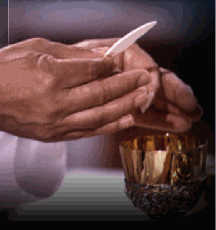
"I don't like ceremony for ceremony's sake," said a Baptist friend of mine in reference to the Catholic Church's liturgy. I smarted off something in return, but should have given a more thoughtful reply. Something like this.
The Real Presence of Christ is why the Church conducts its liturgy with such formality and reverence.
It makes perfect sense. I'm not arguing it here, but if it is true, as the Catholic Church teaches, that Jesus is really and truly and substantially present in the Mass, then there's no other way to be but "formal."
In many if not most non-Catholic Evangelical churches, a worship service finds its climax in the pastor's sermon. At least, that is the most "serious" part -- the time when one is expected to be most focused. (It's when you smack the kids and tell them to sit up straight and be quiet.)
The Catholic Church is different. Her liturgy leads up to a more profound summit.
The Church believes Christ is present in four ways at Mass:
- In the congregation. Where two or more are gathered in His name, Jesus is present.
- In the liturgy of the Word. The spoken Scripture readings from the Old and New Testaments, as well as the biblical psalms and prayers, are heard as if they were from the lips of Jesus. Scripture is God's special communication to us. It is God speaking to us.
- In the priest. The priest acts "in a Jesus way." Through the sacrament of ordination, his soul is indelibly marked. He IS a priest. He is not just performing menial table duties that anyone can do; he fulfills what he really is, for Jesus has shared His own Priesthood with him. The priest, in this way, acts or stands in for Christ. When the priest conducts his priestly duties in celebrating the Mass, it is Jesus standing up there spiritually.
- In the Eucharist. This is the fullest, most profound, most true, most "real" kind of presence -- hence its popular name, "the Real Presence."
The Church believes that, in the celebration of the Eucharist, ordinary bread and wine actually become the true Body and Blood of Christ (not in its appearance, but in its essence), whereas most non-Catholic churches teach that the bread and wine of their "communion," or "Lord's Supper," or "New Testament Passover," etc., are mere symbols that only remind us of Jesus' 2000-year-old sacrifice. Catholics believe that the once-for-all sacrifice of Jesus is presented to God at the altar, and that its power is again applied to us, for we are still all sinners needing God's graces even after accepting Christ as our Savior.
Arguments for or against the Real Presence aside, the fact is that Catholics believe it. And that explains why the Mass is conducted with solemnity.
It also explains why the Mass is seen by many non-Catholics as "ceremony for ceremony's sake." Understandably, they can't relate to anything other than their own experience, for the non-Catholic view of "church" is usually just a place where like-minded believers can fellowship and encourage each other. They listen to the Word of God expounded. They worship God in prayer and song.
Sometimes this kind of limited worship can end up being too folksy. It's almost as if Jesus is our Pal, our Buddy, a heavenly Good Ol' Boy strumming an acoustic guitar with a blues harp in His back pocket. Jesus loves you as you are. And He's most comfortable wearing a tank top, cut-off shorts, and flip-flops.
Catholics also believe Jesus loves us and accepts us all as individuals at the most intimate level. Yet we go on to correctly emphasize that Jesus, in addition to being the lover of our souls, is the King of kings and Lord of lords. He is the Creator that sustains the existence of all things, whether in heaven or on earth. If God did not have us in His mind, we would instantly vanish from existence -- just as quickly as we leapt into existence by His spoken Word.
When we recognize this infinite chasm between the all-powerful, all-loving, life-inherent God of the universe and us puny, sinful humans, we can do nothing but worship Him with awe.
And if the Word of God who created us is literally present on the altar at Mass, we are obliged to act as if His presence is more significant than that of Roy Clark or Buck Owens and the Buckaroos. Jesus is supreme majesty. He is holy, holy, holy -- the Lord God Almighty.
No society is a stranger to ceremony. We have no problem with funerals, weddings, presidential inaugurations, the presentation of medals of honor, etc. So is it then okay -- no, obligatory -- to treat the presence and procession of the Son of God with even more reverence?
Whether Jesus is truly present in the sacrifice of the Mass is what we should ask. The Real Presence is the real question. I'll steer you toward this link, which contains good articles and audio clips that explain the Real Presence of Christ in the Eucharist.
